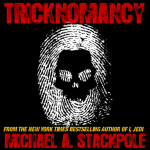The Way of the Dodo Book
In reading a book about the Cold War, I came across interesting definitions of the types of information groups like the CIA share. Cover stories are designed to make something false appear to be true. Disinformation is designed to make something true appear to be false.
Disinformation is, by far, the more pernicious of the two. It destroys a person’s ability to discern truth from falsehood. Once you start believing facts are false, you have no basis from which to tell if anything is true or not. Disinformation erodes your ability to reason, and when a person can’t reason; that person will tend to believe almost anything that sounds plausible—despite the fact that it’s really nonsense.
Advocates of the publishing status quo—house slaves and publishers—have been using disinformation to stop writers and readers from facing a scary future. They’re saying that people like me are saying that books are going the way of the Dodo. Tradpub defenders pointing out that people have predicted “the death of the book” for years now, and “it’s never come true.”—using the tone and tenor of a bemused adult scolding an imbecile. They suggest that anyone who thinks the book will be extinct is stupid or misguided or just vicious, and that no one should worry about the death of the book.
Just a note, a life lesson, if you will: Any time someone suggests that you don’t need to worry about something, that something is worth worrying about.
I have never predicted the extinction of the book. I’ve predicted the end of book publishing and distribution as we currently know it. There is a huge difference there which points to a future that scares the crap out of tradpub defenders.
Here’s the real scoop: The advent of the internal combustion engine did not make horses extinct; but it did, forever, change transportation. Likewise, the rise of digital publishing is not going to make the book extinct, but it will forever change how we purchase and consume the written word. That’s an important distinction for a number of reasons.
1) As you watch the march of technology, especially as it applies to consumer technology, you’ll see that no one has ever gone broke investing in ideas that a) save people money, b) save people time, or c) save people space. An added plus to any of those is having an item which makes people happy and/or plays to a sense of nostalgia. When you look at ebooks, you find something that is cheaper than a normal book, doesn’t require a trip to the store, doesn’t pile up on sagging shelves, and allows you to carry all your favorite books with you in something lighter than the average hardback book. Ebooks win on all of these points.
2) The same technology that allows an author to do books as digital originals will also allow that author to make available short run or print-on-demand editions of those same books. Because many of the POD houses will drop-ship for the author (that means they’ll print and ship to the customer and send the author a check), readers who want a physical copy of a book can get it at a reasonable price.
3) Distribution and delivery has always shaped what gets produced. Short stories and novels get written because traditional publishing had ways to publish and distribute them. Novellas and novelettes were not as popular, not because they’re not valid for storytelling purposes, but because there was no market for them. Likewise, when publishing had a great need for horror novels, they got them out there; likewise techno-thrillers and cyberpunk stories.
Because distribution now is much more fluid, readers can buy all sorts of material direct from writers. This week I wrote and turned in a story for an anthology project. I was running long on word count, as I often do, and fought to bring the story down to the right size. But what was interesting this time out was that I wasn’t afraid of what would happen if the editor said they couldn’t fit my story in (as has happened in the past). Why not? Because I could turn around and make that story available here for folks to buy and read.
Want to know a funny little secret about the tradpub folks, including editors? They all have their ebook readers. They read submissions on them. They send out review copies as ebooks. Why? Because they don’t want to be lugging around heavy manuscripts or sending out expensive review copies. Usually, when working on a book, I’ll get stacks of paper sent to me to pour over and correct, but not any more. (Which means I actually have to go out and buy printer paper, I can’t just turn over some old galley and print on the backs of the pages!)
The tradpub folks know what’s good for them, but they’re so overworked they don’t see the implications of what it means for everyone else. To them, ebooks are convenient because they’re editors and they hate lugging that weight of paper around. They don’t extrapolate to the rest of us—we’re not editors, after all. And why hasn’t the “ease of purchase” sunk in? Because they don’t have to buy books. They call up a friend at another house, or walk down the hall, and get a copy for free—not that they have that much time for leisure reading, mind you. (And editors are generous with authors, too. I’ve had plenty of books sent to me just for the asking.)
The folks who are clinging to tradpub so hard that they’re bleeding from the nails, are desperately trying to convince themselves that change is not happening. They don’t want their apple cart to be upset. They resist change, can’t stand the idea that things are changing, and they figure that if they have you agreeing with them, then change just ain’t happening.
But change is happening. According to Publisher’s Weekly, the American Association of Publishers reported ebook sales are up 159% for the first quarter of 2011. And this is based on sales figures reported by 16 of their 300 or so members. So that data takes into account zero of the self-published authors out there, be they new or seasoned vets selling backlist titles.
Think about what that number truly means. The people who are putting out ebooks and pricing them the same as paperbacks or hardbacks, the people who are windowing titles so the ebooks come out later, the people who are doing everything they can to slow the pace of the ebook juggernaut, are seeing sales spike. And the rest of us, those who are putting out new material, who are bringing old favorites back into availability, and are offering our products at a fraction of what these 16 publishers are, are having a field day.
The reason I keep coming back to this subject (and will continue to talk about it) is simply this: I don’t want to see anyone left behind and hurt because of it. When I started talking about all this stuff four and a half years ago, I had tons of authors looking at me like I had half a synapse worth of brain cells, and that the half I had wasn’t working too well. Back then I’d make a few hundred dollars a year selling stuff from my website.
Since then, sales have increased enough that this year, my Kindle sales alone will pay for my mortgage and my health insurance. From pocket change to serious long green is a big change, and I am not by any means the best person at marketing my work online. Heck, I don’t even have all my backlist novels up and available yet. Even so, there is money to be made, and that money buys me the time to do the sort of work I enjoy doing and sharing with you.
So understand that when someone says “Tsk, tsk, the book isn’t going to go extinct, and you shouldn’t worry your pretty head about it,” they’re pushing their own agenda. They really don’t understand the discussion about digital publishing and distribution. They’re making a glib comment that will make them sound relevant, but betrays their ignorance and hides their fear of change. Look past what they’re saying, and look at the real issues—those being lower costs to readers, faster delivery to readers, and providing a wider selection of work you actually want to read, all done without them—and then figure out why some folks won’t want you to see how bright this new future is.
The book is not dying—it’s moving into a wonderful new age where you will have everything you want and more.
Writing up this series of blog posts is cutting into my fiction writing time. If you’re finding these posts useful, and haven’t yet gotten yet snagged my latest novels, please consider purchasing a book. Nice thing about the new age of publishing is that you become a Patron of the Arts, letting writers know what you’d like to see more of simply by voting with a credit card. (Authors charge less when they sell direct, so you save, we make more, and that frees us to write more.)
 My latest paper novel, At The Queen’s Command, is available at book retailers everywhere.
My latest paper novel, At The Queen’s Command, is available at book retailers everywhere.

Tricknomancy is a braided novel. That’s author for a serial story told through a number of shorter pieces that all come together as a novel. Think of it in terms of a television series. This is series one, consisting of seven episodes. The stories feature Trick Molloy, a magick-using, ex-cop who left the force because he was framed for being a dirty cop. He now works as a bouncer in a strip club, helping friends, solving murders and dealing with an insane family, most of whom would like to see him dead or worse. It’s available for the Kindle, and for sale directly off my website for any epub compliant ereaders



 20. May, 2011
20. May, 2011 








12 Responses to “The Way of the Dodo Book”